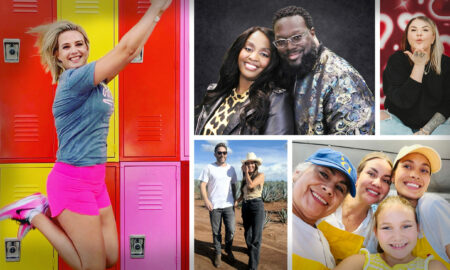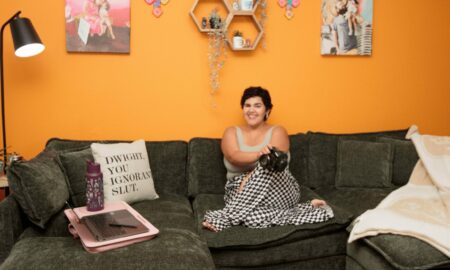

Today we’d like to introduce you to Caleb De Casper.
Alright, so thank you so much for sharing your story and insight with our readers. To kick things off, can you tell us a bit about how you got started?
When I first started playing my music, I couldn’t get booked anywhere, much less get anyone to come to my shows. I was living in Charlotte, NC and my very queer piano cabaret act was not well received by many of the people who lived there. I’m not sure how it is now, but at the time North Carolina was a place where you would be told you were going to hell by complete strangers if they noticed anything effeminate or gay about you. It didn’t help that I called it ‘horror cabaret’ and would end the show by spitting blood and bleeding out of my eyes or adding some other sort of scary theatrical flair to it.
I was fortunate enough to connect with a booking agent named Sean Padilla one night and he immediately vibed with me and my art–an instant supporter and friend. He booked me on a few shows at a bar called ‘Tommy’s Pub’ and I gave it everything I f*cking had. This bar was a double-wide trailer with a NASCAR theme and I stuck out like a sore thumb. I remember the faces when I played my last chord.
There is nothing more punk than a boy singing about boys wearing fishnets and heels in a time and place where I could have been assaulted or killed for it–but I had to do it.
Sean connected me with XETAS by booking us a show together and I ended up connecting with them and left to start my life in Austin, where I almost immediately was given the chance to prove myself with a residency by Cheerup Charlies–the first time I ever got cut a check as an artist. I formed a band, recorded some songs, went on tour, and the opportunities and support just keep coming.
Would you say it’s been a smooth road, and if not what are some of the biggest challenges you’ve faced along the way?
Not. At. All.
I have faced so much adversity as a queer musician it would blow your mind. I have faced so much hardship as a proud and visibly queer person in the South I would need to write volumes about it. Have you ever had to handle the weight of being told by the world that you are a sin? And to weigh that against knowing in your heart who you are at your authentic core? These struggles are not who I am, they are not what I want to be known for, and they are not how I want to promote my music. I would rather explain them through the content of my songwriting and music videos.
I’m not sure how many people know this, but queer artists are a group of people who are not well respected or supported by the music industry. I have gotten my foot in the door for many important meetings with television and industry executives, only to be told by someone in the room that ‘gay is not marketable’ or ‘queer doesn’t sell albums’. My favorite is ‘your material is inappropriate for a mainstream audience…’
I have to make everything up for myself as I go along and I am so, so grateful to the handful of industry people in Austin and my fanbase across the US (and in Chile, Germany and Russia–I see you on my Spotify map, hello!) who see the value in my music and just think what I’m saying and doing is cool enough to support. My growing fanbase means the world to me because they see me in spite of what the industry thinks.
Thanks – so what else should our readers know about your work and what you’re currently focused on?
I put on kickass shows and record bomb-ass music! Sometimes I perform with a full band, other times I perform my material on an acoustic piano, and a few very special times I get the opportunity and budget to do both.
Everything I do is me. I don’t hide anything about myself when I perform or write. I wear costumes and clothing that express my gender nonconformity and I strive to add to the level of queer visibility in the world because it’s so important. I make music because when I was a teenager, I had a really hard time finding myself and being who I was meant to be. When I would try to find solace and expression through my favorite thing in the world–music–there was no music that fit my narrative. There were no songs that made what I was going through ‘ok’. Everything was about him and her and her and him. There were artists that we knew were queer, but they had been made to hide and change their pronouns and identities in their work to fit a broader, more acceptable narrative.
I don’t do that. I will never do that. I make music that I needed to feel normal, human, and loved and I truly believe that if I could listen to Britney Spears or Madonna sing about their experiences with men and ‘get it’ then other people can afford me the same luxury. Music is empathy and it heals and that’s all there is to it. I sell more than records and t-shirts–I’m doling out empowerment and self-worth.
Are there any important lessons you’ve learned that you can share with us?
Be authentic. Be yourself. You can become a star whether they want you to or not–it’s all up to you.
Contact Info:
- Website: www.calebdecasper.com
- Instagram: https://www.instagram.com/calebdecasper/?hl=en
- Facebook: https://www.facebook.com/Caleb.De.Casper/
- Twitter: https://twitter.com/CalebdeCasper?ref_src=twsrc%5Egoogle%7Ctwcamp%5Eserp%7Ctwgr%5Eauthor
- Youtube: https://www.youtube.com/channel/UCy4dZQWFVs8ZtEoXy16pJaw
- Other: https://calebdecasper.bandcamp.com







 Image Credits
Image Credits
Helaine Bach Ismael Quintanilla III Julio César Silva










